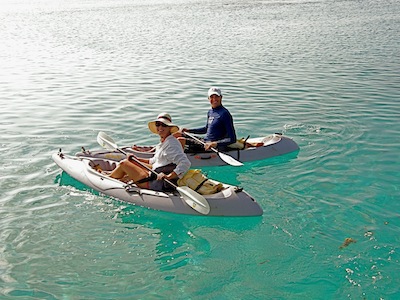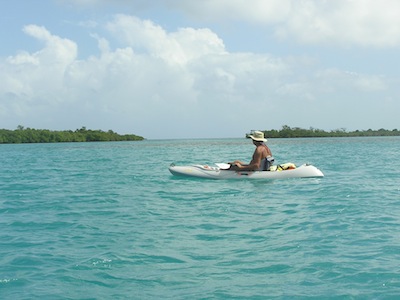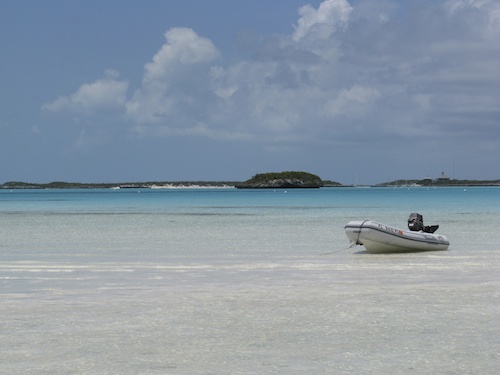Kayaks are easy, safe and stable. However, if you’re new to kayaking, it may take a bit of getting used to! Here are some tips for safety.
 1. Paddle with a buddy boat whenever possible. If there’s no one available and you want to paddle, make sure you let someone else know where you’re thinking of going and when you expect to be back.
1. Paddle with a buddy boat whenever possible. If there’s no one available and you want to paddle, make sure you let someone else know where you’re thinking of going and when you expect to be back.
2. Practice getting in and out of your kayak. Try different entry points on your boat until you discover the one that’s easiest for you. We used to slide in the kayaks from our dinghy in the water until we discovered it’s almost as easy to lower it to the water, tie it on with the long painter, step down on our wide rub rail and then on down into the kayak. I steady it for a minute and then lower myself into place. I leave the paddle on the deck of the main boat but within reach until I’m lowered in and can grab it.
3. Once aboard, sit quietly in the kayak and let current or wind take you to determine if there’s significant wind or current and which way it’s pushing you.
4. Always paddle upcurrent or upwind first as a test to determine how difficult it might be to get back. Last winter in Little Shark River in the Everglades, the current was fierce, but I really wanted to go for a late afternoon paddle. I tested conditions three different times until I felt comfortable I could get back upcurrent to the boat.
5. Wear or have a life jacket within easy reach in case you need it. If you’re new to paddling, you should probably always wear your life jacket until you gain confidence getting in and out of the boat.

6. Practice falling out before it happens! Paddle the kayak to a calm beach area and deliberately fall out. See if you can get back in. Then do it again in water just over your head. I can get back in my kayak from deep water by placing the paddle at a 90 degree angle to the kayak and using it to help pull myself in. Everyone will have a different technique, so learn yours.
7. Always take shoes – you never know when you might need to hop out to pull the kayak up on some new place to explore and water shoes will protect your feet. We think crocs are ideal – they float, don’t stink and don’t cost an arm & a leg in case we lose one overboard.
Does anyone have additional safety tips on this Friday, the 13th? 🙂 Please leave a comment and share! Happy Kayaking! Jan














These are some great tips, and I appreciate your advice to try and have someone with you for safety when you kayak. My husband and I just moved into a new area, and there’s a gorgeous lake nearby, so we’ve been talking about trying kayaking. Neither of us have hardly any experience with it, but we’re excited to give it a try, and we’ll definitely try to go together so we can stay safe. Thanks for the great post!
Hey, thanks for your great tips.I’m in a problem with getting in and getting out from my kayak. I can’t easily get in or out from kayak. Is it okay as new in kayaking?
Be safe Richard – you’ll figure it out – getting in & out of a kayak can be challenging – there are many different solutions & I’m sure you’ll find the best one for your situation. Cheers! Jan